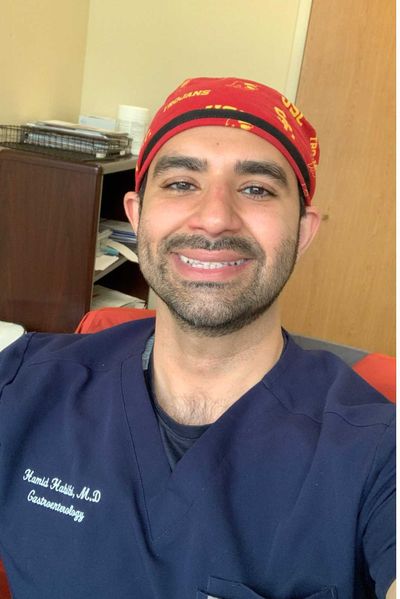‘My heart aches for all of them’: Afghan American doctor in Spokane feeling mixed emotions watching U.S. forces leave

Dr. Hamid Habibi felt mixed emotions Monday when he learned the U.S. had withdrawn its last troops from Afghanistan.
He felt guilty because he was safe in Spokane while some of his family members in Afghanistan were in danger. He felt glad American soldiers were getting home safe. And he felt profound sadness for the millions of Afghans whose lives might change for the worse now that the Taliban has reclaimed the country.
“It’s honestly been the hardest day,” the Afghan American gastroenterologist and hepatologist said. “It’s a very sort of paradoxical emotion that I’m feeling. It’s like you’re stuck in between.”
On Monday, the U.S. completed its withdrawal from Afghanistan, ending the longest war in American history. For many Afghan Americans like Habibi, watching the military exit during the last few weeks has been hell.
One image stands out among all the videos and news stories that have come out of Afghanistan in the last few weeks, Habibi said.
Two weeks ago as the Taliban overtook Kabul, Afghans swarmed the airport, trying to flee. Some clung to a U.S. military cargo plane as it took off. A few managed to hold on even as the plane climbed into the air, but their grips eventually gave. They fell hundreds or thousands of feet to their deaths.
The video has been haunting Habibi.
“Seeing those people on those airplanes, it becomes very emotional,” he said, choking up. “Those people that were jumping on the planes could have been me or my family.”
Habibi was born in Afghanistan in the 1980s. When he was four, his family moved to Pakistan as refugees.
He lived in Peshawar until he was 10, then moved to the U.S. in 1993. His dad had settled in New York City first, before Habibi, his mother and six sisters joined him.
“When I first came, I didn’t speak a word of English at all,” he said.
After growing up in Queens, Habibi became a doctor.
“I always kind of knew I wanted to go to med school, knowing what a lack of a health care system can do to a country,” Habibi said.
Today he practices medicine in Spokane.
When Habibi was growing up in New York, his dad told him and his sisters to cherish the opportunities they had in America, especially the opportunity to get an education. They had left a war-torn country and felt living in the U.S. was a blessing.
Habibi said he has always felt guilty growing up in America because he knows his cousins in Afghanistan, especially his female cousins, never had the same chances he had.
“If it wasn’t for the United States of America, I would have probably been dead,” Habibi said. “For that I am grateful for the rest of my life.”
For the last 20 years, women and girls have been able to receive an education in Afghanistan, a departure from the Taliban regime in the late 1990s, Habibi explained. He said that with U.S. troops gone and the Taliban in charge again, that’s likely to change, even though the Taliban has said girls will still be able to go to school.
“It’s almost this sort of show so that the world and the media don’t see their ugly, nasty barbaric sides,” Habibi said. “Once they know that the Americans have left, the world has left, they are probably going to resort back to their old ways.”
American involvement made progress for women possible, and it’s hard to overstate how important those gains were, Habibi said.
“In the last few weeks we have wiped away that progress,” he said. “It’s almost like going back to the dark ages.”
Habibi said the U.S. had to leave Afghanistan eventually, but the withdrawal didn’t have to be this rushed and chaotic. Now Habibi is worried for his aunts, uncles and cousins’ safety. He said he doesn’t think any of them will qualify for special U.S. visas and he doesn’t know how, or if, they’ll be able to leave.
Many Afghans are terrified to leave their homes now that the Taliban is back in charge, Habibi said. They don’t want to go to school or leave their homes to get groceries.
One of Habibi’s uncles was traveling from Jalalabad to Kabul a few weeks ago. Taliban fighters stopped him, beat him up and took all his valuables.
Some of Habibi’s family members went to the Kabul airport Wednesday, hoping to leave the country. They stood in the airport for nearly 12 hours.
“Finally my uncle and his wife, they said, ‘Let’s just go back home,’ ” Habibi said.
It was a fortunate decision, Habibi said. On Thursday, a suicide bombing at the airport killed 13 U.S. military members and dozens of Afghans.
Millions of Afghans want to leave the country to avoid living under the Taliban regime, Habibi said, and he hopes that America will welcome as many of them as possible. He said they aren’t a threat.
“The Afghan people do not hate America. We are some of the most hospitable people in the world,” Habibi said. “My heart aches for all of them.”